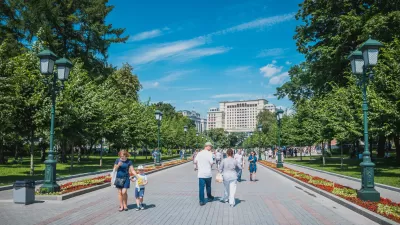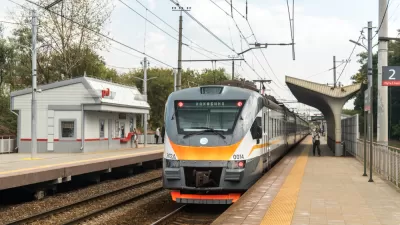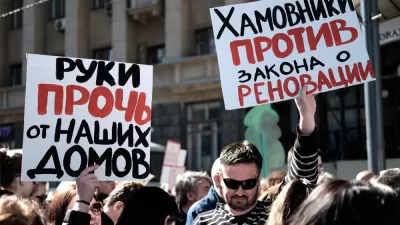Moscow's Mayor has pushed an agenda to beautify the city, create social spaces, and make the city more walkable, but critics see the move towards walkability as more of a forced march.

Moscow has embraced new urbanism and all of it's benefits: pedestrian friendly streets, public spaces, and beautiful landscaping creating an inviting public realm. However, critics of the program to transform the city have noted that the makeover is leaving out or ignoring the input of the city's population. Maria Antonova of Foreign Policyreports that the changes to the city's infrastructure have been quick, sweeping and often done without any warning. While detractors of Moscow Mayor Sergei Sobyanin say the $2 billion city beautification project has been undemocratic, the mayor's backers note that the program is European in outcome, "but its realization is more Asian."
“In Paris or New York it takes two years to redevelop one street: they talk to the residents, they do a test segment, and finally do the actual work,” Muratov said. In Sobyanin’s Moscow, changes are sudden and often unpredictable, with residents treated like minor inconveniences in a process that is moving through the city like wildfire.
...Sobyanin is trying to create social spaces — places where people can enjoy themselves in a pleasant and relaxed environment. These are different from public spaces, where citizens can engage in activities that might make authorities uncomfortable.
“A space can be physically comfortable even in any dictatorship,” Muratov said. “Streets are nice in Singapore.”
Antonova reports that the efforts to remake the city have also resulted in a reigning in of street performers and artists, the removal of the city center's popular trolleybuses, and the destruction of retail kiosks. However, protests of the forced urban renewal have been stifled, with Antonova reporting that some 200 applications to hold protests of the trolleybus removal being denied by the city.
FULL STORY: Vladimir Putin’s Walkable Streets

Alabama: Trump Terminates Settlements for Black Communities Harmed By Raw Sewage
Trump deemed the landmark civil rights agreement “illegal DEI and environmental justice policy.”

Study: Maui’s Plan to Convert Vacation Rentals to Long-Term Housing Could Cause Nearly $1 Billion Economic Loss
The plan would reduce visitor accommodation by 25% resulting in 1,900 jobs lost.

Planetizen Federal Action Tracker
A weekly monitor of how Trump’s orders and actions are impacting planners and planning in America.

Wind Energy on the Rise Despite Federal Policy Reversal
The Trump administration is revoking federal support for renewable energy, but demand for new projects continues unabated.

Passengers Flock to Caltrain After Electrification
The new electric trains are running faster and more reliably, leading to strong ridership growth on the Bay Area rail system.

Texas Churches Rally Behind ‘Yes in God’s Back Yard’ Legislation
Religious leaders want the state to reduce zoning regulations to streamline leasing church-owned land to housing developers.
Urban Design for Planners 1: Software Tools
This six-course series explores essential urban design concepts using open source software and equips planners with the tools they need to participate fully in the urban design process.
Planning for Universal Design
Learn the tools for implementing Universal Design in planning regulations.
Caltrans
Smith Gee Studio
Institute for Housing and Urban Development Studies (IHS)
City of Grandview
Harvard GSD Executive Education
Toledo-Lucas County Plan Commissions
Salt Lake City
NYU Wagner Graduate School of Public Service




























